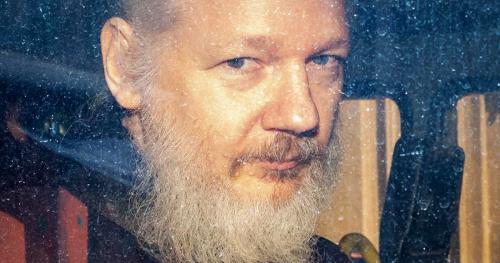Assange: the Ecuadorian State acted without guaranteeing due process
The Ecuadorian Ombudsman's Office is concerned about the absence of due process guarantees and the use of the issue of sovereignty as a form of violation of rights.
- Opinión

Pressenza interviewed Javier Arcentales Illescas, Human Mobility Advisor of the Ombudsman’s Office of Ecuador, an institution that spoke today about the detention of Julian Assange, at the consulate of Ecuador in London. Here is the interview.
Q: The Ecuadorian Foreign Minister, the Interior Minister and government representatives have said today in a press conference that the decision to remove Julian Assange from the London embassy is in accordance with the law and they have mentioned some legal instruments, indicating that Assange broke agreements of the Caracas Convention. What is your position on this statement?
J.A.: One of the main elements of concern about the decision taken by the government is the failure to observe due process, particularly article 81 of the Organic Law on Human Mobility in force in Ecuador, which indicates the procedure for revoking the nationality of a person from another country who is here or who has been nationalized as an Ecuadorian. According to the LOMH, the person must have been previously notified, have had the possibility of arguing against that notification, that there is a reasoned decision and that the person has the opportunity to respond to those motivations. Apparently, none of this has been fulfilled in the case of Julian Assange. In fact, the chancellor, even in his presentation at the Assembly, has not justified it. Therefore, there would be a breach of due process, pointed out in Art. 81 of our own Law, without other international human rights standards.
It is precisely the Inter-American Commission and the Inter-American Court of Human Rights that have said that the guarantees of due process must be observed throughout the process involving the loss of nationality or the recognition of a person’s legal personality, and in this case it seems that it has not yet occurred.
With regard to the issue of asylum, we are also concerned because although Julian Assange was under the figure of diplomatic asylum, governed by the Caracas Convention, it is no less true that he is a person who would require international protection and, therefore, there are several principles to respect: non-refoulement, for example. The condition of a person in need of international protection implies the guarantee of his right to life, liberty or integrity because these are rights that are at risk. Therefore, in order to withdraw the condition of asylum, the Ecuadorian government would have had to carry out a rigorous examination to determine that none of these rights would be at risk. This examination has not been done by the government.
Q: President Moreno, in his official statement, said that the government had demanded of the UK government that Assange not be sent to any other country where he might suffer torture or the death penalty. Can the Ecuadorian government demand such a thing of the UK?
J.A.: From the moment Assange is removed from the Ecuadorian consulate, the Ecuadorian state has no instrument to guarantee the freedom, life and integrity of Julian Assange. So, this statement is basically a statement of good intent. The Ecuadorian state cannot tell the United Kingdom “you have failed to do what you promised me”, that would make no sense. There is no mechanism by which that commitment can be demanded.
Q: Can Ecuador’s decision have consequences for the country, beyond public opinion, vis-à-vis international organizations?
J.A.: I would think so. There could be a state responsibility above all just for all breaches of due process and other international standards. It could involve observations from both United Nations bodies and the Inter-American System. This will also depend on the paths that Assange’s defense decides to take but, as we are seeing now, the shortcomings of the Ecuadorian state could imply an international responsibility.
Q: Is there any possibility of reversing what has happened from the legal point of view? What are the alternatives that Assange could have?
J.A.: The alternatives that Julián Assange has now are very few, it has even been reported that he is already being tried by a court in the United Kingdom. His room for manoeuvre is shrinking. Perhaps human rights bodies in Europe can be an alternative.
Q: What is the basic position of the Ombudsman’s Office in this situation?
J.A.: The central points are: a concern about the absence of due process guarantees, a concern about the use of the issue of sovereignty as a form of violation of rights. We are emphasizing that the adoption of sovereign decisions of a State can never imply the violation of Human Rights of any person, even less of a person that the State has declared as subject of international protection.
We are saying that there should have been a strict assessment of the risks of terminating asylum or, finally, the possibility of contacting another state so that they can receive him, however complex it may be. ( Translated from Spanish by Pressenza London)
12.04.2019
Nelsy Lizarazo, Colombian, living in Quito, Ecuador. Professional background in philosophy, literature, political sciences and international relations.
Pressenza, International Press Agency
Del mismo autor
- Racismo y discriminación explícitos contra presidente de la CONAIE 07/07/2021
- Derecho Humano a la Educación e Internet 10/06/2021
- Public education: our banner 12/02/2021
- Educación pública: nuestra bandera 11/12/2020
- Assange: el Estado ecuatoriano actuó sin garantizar el debido proceso 12/04/2019
- Assange: the Ecuadorian State acted without guaranteeing due process 12/04/2019
- Montserrat Boix: el lugar de la mujer en internet y Wikimujeres 11/10/2017








